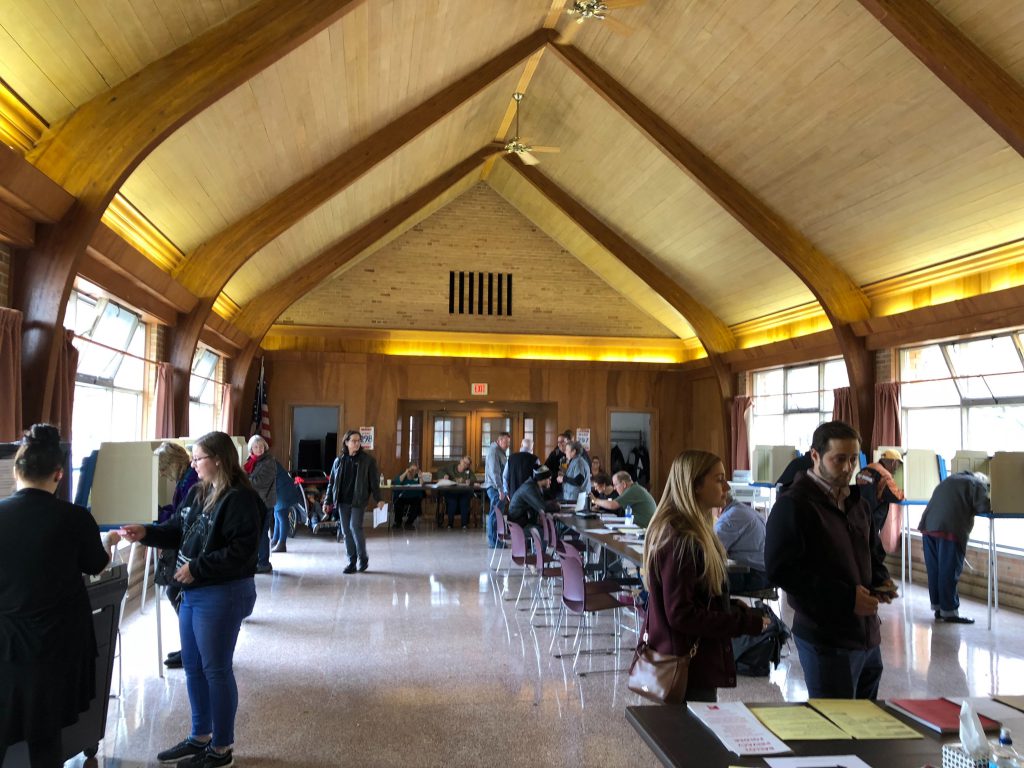Republican Legislators Deny Evers’ Appointment to Elections Commission
Vote nixes Joe Czarnezki, the Democratic appointee to bipartisan commission.
Republicans on the Wisconsin Senate Committee on Shared Revenue, Elections and Consumer Protection voted Tuesday to deny the appointment of Joseph Czarnezki, a Democrat, to the Wisconsin Elections Commission (WEC) because of his participation in an effort to keep WEC Administrator Meagan Wolfe in her job.
The committee’s 3-2 vote against Czarnezki’s appointment took place on the same day the election committees of both legislative houses voted to advance several bipartisan election-related bills.
The only person to testify against Czarnezki’s appointment in a public hearing also held Tuesday was former Menomonee Falls Village President Jefferson Davis, one of the state’s most prominent election deniers. Attending the meeting with Davis was former state Rep. Timothy Ramthun, who ran for governor last year on a platform almost entirely based on stoking Republican fears of election fraud.
The votes after Davis’ heated testimony opposing the appointment continued the Legislature’s trend this session: taking action on election bills with bipartisan support in contrast to the the past three years of heated election discourse in Wisconsin, while simultaneously acceding to the demands of the state’s most high profile election deniers.
At a hearing Tuesday morning, Rep. Scott Krug (R-Nekoosa), chair of the Assembly Committee on Campaigns and Elections, said it’s been an unwritten rule this session that only bills with bipartisan support get heard in his committee.
“This is what I like about this session, we’re open, we’re communicative, we’re collegial,” he said during a cross-aisle dialogue on a bill.
But as Krug has worked to bring the temperature down in the Assembly — which in the previous legislative session was often a platform for election deniers — the Senate has started a legal battle with the WEC at the behest of figures like Davis and Ramthun.
The fight over Wolfe’s reappointment as administrator started in June when her four year term expired. In an effort to keep her in the position, the three Democrats on the WEC abstained from the body’s vote to renominate her. State statute requires four votes to advance an administrator, and with the abstentions, the commission only had three.
The maneuver was taking advantage of a state Supreme Court decision last year that stated an appointee to a state position is able to hold over in that position until their replacement is confirmed by the Senate. That precedent was set after Republican senators acted to keep a Republican appointee on the state’s Natural Resources Board in his position in an attempt to retain GOP control over issues such as wolf hunting and water quality.
Despite the effort of the Democrats on the commission, Republicans in the Senate moved Wolfe’s nomination forward as if it had been sent to them, voting last month to fire her. A lawsuit over the dispute is pending in Dane County Circuit Court.
After the committee’s vote to deny Czarnezki’s appointment, Sen. Mark Spreitzer (D-Beloit), told reporters he wished the Legislature could focus on necessary improvements to the state’s election laws without giving in to the demands of election deniers.
“It’s unfortunate, you know, we are doing some good bipartisan work on elections and I wish we could just focus on that and set aside the conspiracy theories,” Spreitzer, one of the two Democrats on the Senate committee and an author or co-sponsor on a number of the election bills moving toward a vote. “The fact that we have legislators in the majority party who are voting with those folks and are giving platform to those folks, that is really unfortunate. There’s so much good work we can and should be doing and whether it’s the conspiracy theories or the efforts to undermine the work of the Wisconsin Elections Commission by going after folks like Meagan Wolfe and now Joe Czarnezki, that’s not going to help our 2024 elections be run smoothly.”
Czarnezki, the former Milwaukee County clerk and a former state senator, was nominated by Gov. Tony Evers to a commission seat that is statutorily required to be held by a Democratic former clerk. The status of his nomination is still dependent upon a vote of the full Senate. He can remain on the commission until the Senate vote.
At a press conference Tuesday, Evers said that if Republicans continue to knock down his appointments to state boards — including Czarnezki and several appointees to the NRB last week — he’ll start naming more partisan figures to replace them.
Spreitzer noted that every person nominated to this seat is going to be a Democrat, so the Republicans shouldn’t let ideology get in the way of confirming a qualified person to the seat because they aren’t likely to agree with anyone nominated to fill the role.
“The governor can appoint faster than the Senate can fire and there’s going to be a Democratic former clerk in this position that the governor appoints off of a list provided by the Democratic Party, so I certainly hope the full Senate will confirm Joe Czarnezki,” Spreitzer said. “I think he makes a great Commissioner but if they choose to not confirm him, there will be another Democratic former clerk in this position.”
Evers spokesperson Britt Cudaback wrote on Twitter Tuesday that if the full Senate votes to deny Czarnezki, “there will be no daylight” between that vote and when Evers names his replacement.
Agreement across party lines
Aside from the Czarnezki vote, the elections committees in both houses voted nearly unanimously Tuesday to advance several election bills.
The Assembly committee voted 8-1 to approve a bill that will change how nominating signatures are counted for a candidate to get on the ballot . Current law includes a maximum allowable number of signatures that a candidate is allowed to submit and prevents local election clerks from counting a candidate’s surplus signatures, even if the initial batch did not reach the threshold to get on the ballot. The bill would allow clerks to accept signatures from the surplus to meet the requirement.
After those bills were advanced, the committee held a public hearing on four additional bipartisan bills. One would allow voters to opt in to a system that sends a text message when a municipal clerk receives their absentee ballot request and sends another when their ballot is received. Another bill would change the rules guiding elected officials’ communications with their constituents, allowing officials to send citizens information during a declared state of emergency and changing the deadline by which communications must stop past the end of the legislative session.
A third bill would change the timeline in which absentee ballots must be sent during the spring elections in a presidential election year. Under current law, absentee ballots for the presidential primary in April need to be sent before the February nonpartisan primary. Because of that overlap, clerks must send out three separate absentee ballots to people voting in two elections. The bill would undo the overlapping deadlines for all voters except those in the military or living overseas, for whom deadlines are set by federal law.
The Assembly committee also heard testimony on a bill that would cut the price that people must pay who request the state’s full voter database from the WEC. The charge under current law is $12,500; the bill cuts it to $250. The price has been a routine complaint of prominent election deniers seeking to analyze the database for problems with voter registrations.
Testifying in favor of changing the price, Davis said that opening access to the entire database could finally shut down conspiracy theorists and convince them the 2020 election was held fairly.
“We’re in favor of this, we’d love to graduate from the anecdotal accusations and move to the hard evidence,” he said. “This circular argument we’ve had might just go away. Going forward, this would shut up a lot of people on both sides.”
The Senate committee, prior to the divided vote on Czarnezki, voted unanimously to advance the text notification bill, the spring absentee timeline bill and a bill that adds a number of protections for election workers. The committee also voted unanimously for a bill requiring municipalities that livestream the canvass meetings in which elections are certified to retain recordings of those meetings.
Dems introduce automatic voter registration
Aside from the legislative action in the elections committees of both chambers Tuesday, a group of Democratic legislators introduced a package of their own election bills aimed at increasing access to the ballot and improving voter education.
Included in the package is a proposal from a number of freshman Democratic representatives to automatically register all eligible voters in the state.
“The heart of our democracy rests on the ability of all citizens to participate in free and fair elections,” the group of representatives said in a statement. “Any barrier to a citizen’s participation, however small, is also a barrier to democracy. Many residents in rural and urban parts of Wisconsin struggle to get registered. Automatic Voter Registration is one way to ensure everyone has access to the most basic American right – voting.”
Senate election committee denies appointment of Dem election commissioner over administrator vote was originally published by the Wisconsin Examiner.
If you think stories like this are important, become a member of Urban Milwaukee and help support real, independent journalism. Plus you get some cool added benefits.





















